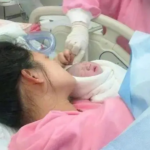Two Sisters Give Birth on the Same Day
In 2013, two special expectant mothers, sisters Christina and Annette, checked into a hospital in California, USA. Not only were they sisters, but they were also pregnant at the same time and even shared the same due date. Both women eagerly awaited the arrival of their little ones.

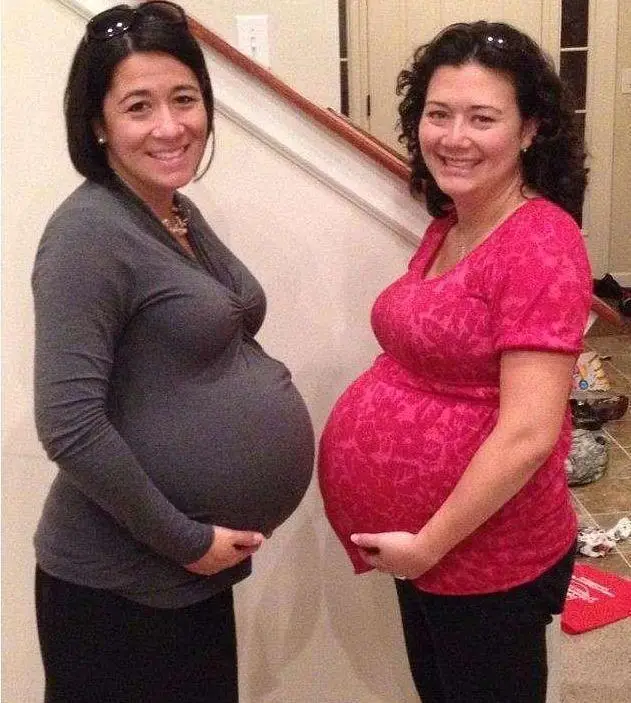
Sisters Christina and Annette.
The sisters shared a very close bond. Throughout their pregnancies, they often accompanied each other to prenatal check-ups, sharing the joys and challenges of pregnancy. On the day of their admission, their parents were also present to lend their support, hoping for a smooth delivery for both. Due to concerns about managing two births at once, the family decided that Christina, the older sister, would undergo a planned C-section first.
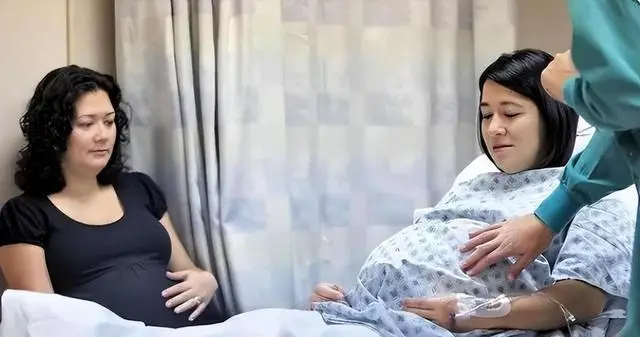
Both sisters, Christina and Annette, went into labor on the same day.
However, a few minutes after Christina entered the operating room, Annette suddenly experienced intense pain and also went into labor. In the end, they both gave birth on the same day: Annette delivered two baby girls, while Christina welcomed two baby boys. Fortunately, all four babies were healthy and doing well.
A Surprising Truth
When the babies arrived, George, Annette’s husband, couldn’t contain his joy. He hugged the doctor tightly and kept saying, “I have children now; I have four children!” leaving everyone puzzled. The doctor performed genetic testing to ensure comprehensive medical information, and the results were shocking: All four children shared the same father, and it was George.
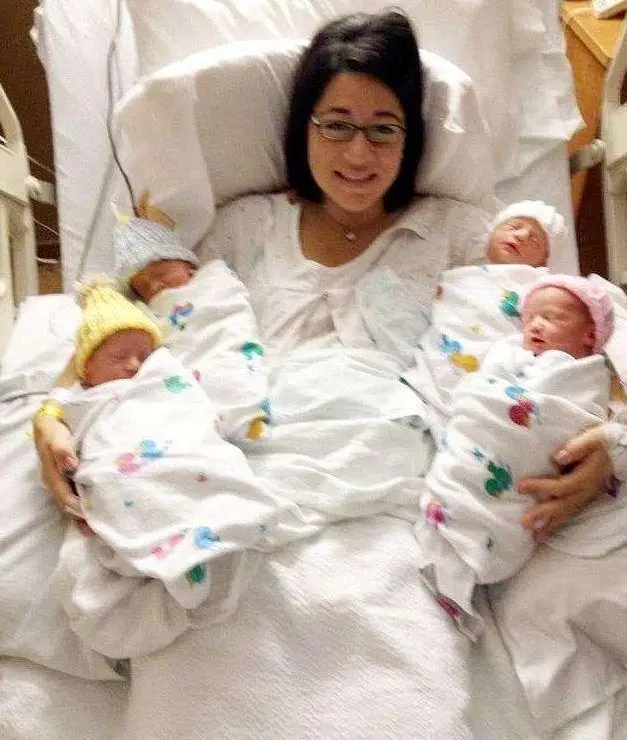
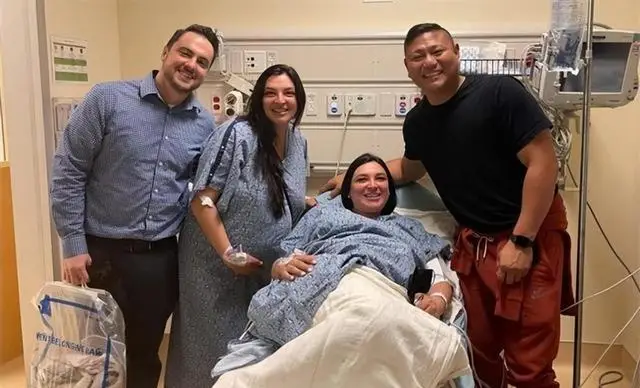
The happy family welcomes four new members.
Surprisingly, the family didn’t seem confused but rather delighted, as if they had known this outcome all along. So, what was the truth behind this situation?
Annette and Christina are two sisters with a three-year age gap. They grew up very close, but as adults, they led separate lives. Christina married early and quickly started a family, living a happy life. On the other hand, Annette had a blissful marriage with George but struggled with infertility.

Annette faced challenges with natural conception.
For five years, Annette and George tried to conceive without success. Upon consultation, they discovered that Annette had difficulties with natural conception. Doctors advised them to consider surrogacy, but the high costs and complex process made them hesitant.

Christina decided to help her sister carry a pregnancy.
Seeing her sister’s distress, Christina made a bold decision: she would help Annette become a mother. Christina shared, “As sisters, I couldn’t bear to see her in pain. I wanted to help Annette fulfill her dream of motherhood.”
After careful consideration, the family decided to implant embryos in both sisters to increase the chances of success. Fortunately, both Christina and Annette became pregnant, and miraculously, they were both carrying twins.
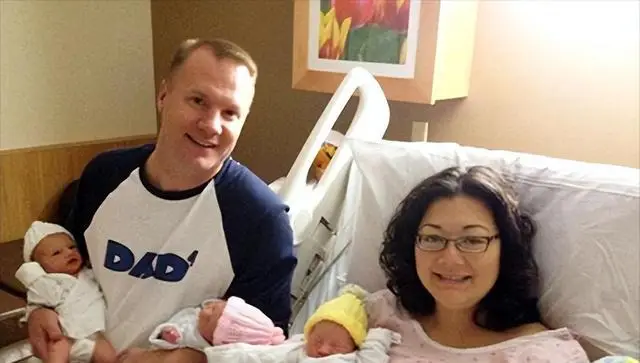
On the delivery day, Annette gave birth to two girls, and Christina delivered two boys.
On the day of delivery, Annette gave birth to two beautiful girls, and Christina welcomed two healthy boys. George was overjoyed at becoming a father to four children at once. Christina also loved the babies as if they were her own and has been a constant support to Annette in her motherhood journey.
Factors Affecting Women’s Natural Fertility
Women’s natural fertility issues can stem from various factors related to reproductive health, lifestyle, and environmental influences. Here are some of the most common causes:
1. Hormonal Imbalances
– Polycystic Ovary Syndrome (PCOS): A common cause of irregular or absent ovulation.
– Premature Ovarian Failure: Ovaries stop functioning before the age of 40, leading to estrogen deficiency and absence of ovulation.
– Hormone Imbalances: Hormones related to the menstrual cycle, such as LH, FSH, estrogen, or progesterone, may be unstable.
2. Uterine and Fallopian Tube Issues
– Blocked Fallopian Tubes: Caused by pelvic inflammatory disease, endometriosis, or previous surgery, hindering the meeting of sperm and egg.
– Endometriosis: Uterine lining tissue grows outside the uterus, impacting fertility.
– Uterine Abnormalities: Conditions like a double uterus, heart-shaped uterus, or uterine polyps reduce the likelihood of embryo implantation.
– Uterine Infections: Infections caused by bacteria or viruses can damage the uterus.
3. Age
Women over 35 experience a gradual decline in fertility due to reduced egg quantity and quality, leading to a higher risk of chromosomal disorders.
4. Chronic Conditions
– Diabetes: Can impact the menstrual cycle and ovarian function.
– Thyroid Disorders: Both hypothyroidism and hyperthyroidism can cause hormone imbalances, affecting ovulation.
– Obesity or Underweight: Unstable weight influences hormones and reproductive function.
5. Lifestyle and Environmental Factors
– Smoking: Damages eggs and impairs fertility.
– Alcohol and Substance Abuse: Reduces fertility and disrupts the menstrual cycle.
– Stress: Increases cortisol levels and impacts reproductive hormones.
– Exposure to Toxic Chemicals: Pesticides, heavy metals, or polluted environments can be harmful.
6. Other Factors
– Genetic Disorders: Certain inherited conditions can affect fertility.
– Immune System Disorders: The immune system may attack fertilized eggs, preventing implantation.
– Blood Clotting Disorders: Reduce blood flow to the uterus, making embryo implantation difficult.
What is a Trimester? Everything You Need to Know About the Stages of Pregnancy.
The trimesters are the three distinct phases of a pregnancy. Each trimester marks a unique stage in the development of the fetus, and understanding these trimesters is essential for expecting mothers to ensure a healthy pregnancy journey. Stay tuned as we delve into the world of trimesters and unravel their significance in a mother’s and baby’s life.





























